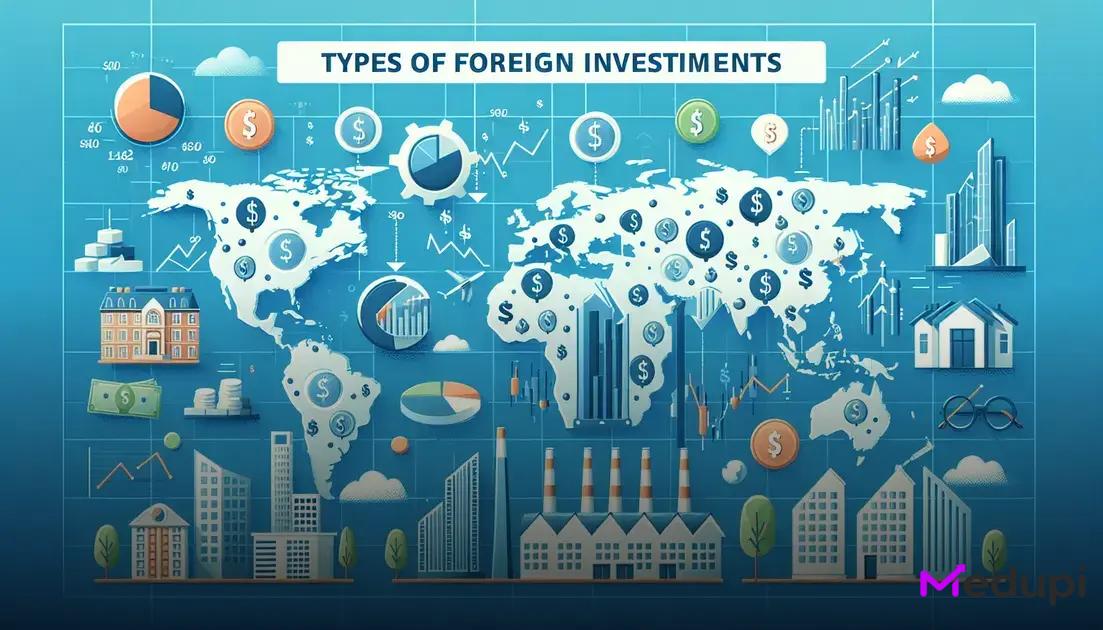ADVERTISEMENT
Foreign investments are pivotal in driving economic growth and prosperity worldwide. By diversifying assets and tapping into international markets, investors can mitigate risks and maximise returns.
Understanding foreign investments
Foreign investments play an essential role in the global economy. By placing capital in different countries, investors can diversify their portfolios and access new markets. Foreign investments can be classified into two main categories: direct investments and portfolio investments. Direct investments involve acquiring a controlling interest in a foreign company, while portfolio investments are about purchasing foreign financial assets such as stocks and bonds.
ADVERTISEMENT
The primary goal of foreign investments is often to seek higher returns than those available in the investor’s domestic market. Additionally, these investments can lead to greater market efficiency as capital moves to areas where it is most needed.
Debates often arise regarding the impact of foreign investments in developing countries. On one hand, they bring much-needed capital and expertise. On the other, there’s concern about local businesses being overshadowed by foreign firms. Proper regulation and policies can help maximise the benefits while mitigating the downsides.
ADVERTISEMENT
In recent times, emerging markets have become particularly attractive to foreign investors. These markets offer growth potential that developed economies might not provide. Therefore, understanding the nuances of foreign investments is crucial for anyone looking to engage in international finance and trade.
Types of foreign investments

Direct Investments
Direct investments involve a firm or individual purchasing a significant stake in a foreign business. This can range from establishing new facilities to acquiring existing businesses. A notable advantage is the control and management influence the investor can exert. Direct investments often lead to the transfer of technology and business practices, fostering economic growth in the host country.
Portfolio Investments
Portfolio investments refer to investments in foreign financial assets, such as stocks and bonds. Unlike direct investments, these do not provide the investor with control over the foreign entity. Portfolio investments allow for diversification of assets and spreading risk across multiple markets. They are more liquid compared to direct investments but also come with higher market risk.
Commercial Loans
Commercial loans involve banks or financial institutions providing loans to businesses or governments in other countries. These loans can be used for infrastructure projects, business expansions, or other economic activities. Commercial loans can foster diplomatic and economic relationships between countries.
Official Flows
Official flows are government-to-government investments, often in the form of aid or loans. These investments aim to boost economic development and foster goodwill between nations. Official flows can include grants for specific projects or general budgetary support to improve economic stability.
Mixed Investments
Mixed investments combine features of both direct and portfolio investments. Investors may acquire a portion of equity along with financial instruments like bonds. Mixed investments offer a balance of influence and liquidity, allowing investors to have a stake in business operations while maintaining flexibility.
Benefits of foreign investments
Strong Economic Growth
Foreign investments provide crucial capital that fuels economic expansion. Countries benefit from improved infrastructure, job creation, and access to new technologies. This infusion of capital often leads to a more vibrant and competitive market, enhancing productivity and spurring innovation.
Employment Opportunities
When foreign companies invest in local markets, it often leads to new businesses and factories. This directly translates into an increase in employment opportunities for the local population. Not only does this help reduce unemployment, but it also promotes skill development and workforce training.
Access to Advanced Technology
Foreign investments frequently bring with them cutting-edge technologies that might not otherwise be available. This influx of advanced technology can significantly improve operational efficiencies, increase product quality, and enable local businesses to compete globally.
Boost in Exports
With the establishment of new businesses and the infusion of technology, countries often see a rise in exports. Foreign companies may use the host country as a base for their international operations, thus channeling more products and services to the global market.
Enhanced Financial Health
An inflow of foreign capital can strengthen a country’s financial health. This is primarily due to the creation of new markets and the resulting increase in tax revenues and foreign exchange reserves. These factors are pivotal in stabilising the local economy and can lead to improved public services and infrastructure development.
Challenges in foreign investments

Foreign investments play a crucial role in global financial strategies. However, they come with their set of challenges. Regulatory Issues: Different countries have different regulations, and navigating these can be complex. Companies need to understand local laws and ensure compliance to avoid legal issues.
Political Instability: Political changes in a country can affect the investment climate. Investors face risks of policy changes, nationalisation of assets, or even sudden taxation that could impact returns.
Currency Fluctuations: Currency values can change rapidly. Investments in foreign countries involve exchange rate risks which can affect profitability. Companies must have strategies to mitigate these risks.
Cultural Differences: Business practices vary from country to country. Understanding and adapting to local cultures is essential for successful investment. Miscommunication or cultural misunderstandings can lead to failed investments.
Economic Stability: Economic conditions of a country directly impact returns on investments. Investors must assess economic indicators and forecasts to make informed decisions.
Future trends in foreign investments
One of the major shifts in foreign investments is the increasing adoption of technology and innovation. Countries are now placing significant emphasis on tech startups and digital economies, seeing them as future growth pillars. This shift is driven by the realisation that technology can enhance efficiency, market accessibility, and scalability in ways traditional sectors cannot.
Additionally, sustainable investing has gained momentum. Investors are no longer just looking at financial returns; they are also considering environmental, social, and governance (ESG) factors. Sustainable investments are becoming key drivers in global financial strategies, promoting responsible business practices and long-term growth.
Geopolitical dynamics are playing a crucial role too. With shifting alliances and emerging markets, the landscape of foreign investments is continuously evolving. Countries like India and Vietnam are experiencing an increase in foreign capital due to their growing markets and favourable economic policies.
Blockchain technology and cryptocurrencies are also influencing the future of foreign investments. These innovations offer new avenues for cross-border transactions, reducing costs and increasing transparency. Investors are keenly watching how these technologies will further shape global finance.
Government policies and regulatory frameworks are increasingly becoming supportive of foreign investments. Nations realise the immense benefits foreign capital brings to economic growth and development. This support ranges from tax incentives to streamlined processes for foreign business establishments.





